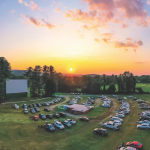The ability to integrate software-based audio recording systems into FOH racks has put pressure on the conventional remote recording sector. As discussed here previously, the golden era of live recordings has passed, an era capped perhaps by the best-selling live album of all time, Garth Brooks' 21 million-plus Double Live LP in 1998.
Even as live music emerged as the primary revenue generator for an ever-larger number of music artists, the number of live LPs has declined steeply. That's put pressure on the small coterie of high-end remote recording truck operators in the U.S. Now, one of them is trying a new strategy: they're going to call a cab.
Ready to Roll
Remote Taxi is a scaled-down three-year-old extension of Peter Brandt's large-truck remote company, Remote Recording, based in Solingen, Germany. Inside an actual London "black cab," Brandt has shoehorned an Avid Pro Tools HD system, Avid Artist Control and SPL NEOS monitoring and mix consoles, Euphonix AM713 and MA703 analog/MADI converters, Adam A3X active audio monitors, a Riedel RockNet 300 Series digital audio network and assorted computers and displays.
But it's the business model that's of interest here. After a couple of years of discussion, Karen Brinton, president of Remote Recording, Inc. in New York (that both companies have the same name is purely coincidental, though highly serendipitous), has partnered with Brandt to bring the Remote Taxi brand and concept to the U.S.
The first black cab will be on the road this summer, after having been shipped to the U.K. for updating by London Taxi International (LTI), the official representative of the iconic vehicles (which are now manufactured in China) and then to Germany for equipping as a remote audio van.
Brinton says the business will grow on a franchise basis, with Remote Recording operating one or more vehicles in the New York and Los Angeles areas and franchisees buying in for other regions, all operating under the Remote Taxi banner.
A New Niche
So can going smaller overcome the headwinds that the conventional remote audio truck market has encountered in recent years? Brandt and Brinton say yes. Compared to a typical OB van, the Remote Taxi offers a more cost-effective live recording solution that's better scaled to the music business' current indie paradigm, though it's outfitted and operated at a level that can easily interface with conventional remote rigs – Remote Taxi has so far done gigs ranging from stadiums to clubs in Europe.
"It bridges the gap between flypacks and big trucks," says Brinton, who took over Remote Recording Inc. from founder David Hewitt in 2003. "It will make [location] recording affordable for the music business again. I can really see six of these cabs running around Austin at South by Southwest next year. And it offers sports and other broadcasting a more cost-effective option for surround sound as an adjunct for HD video trucks."
Franchise prices haven't been determined yet, but Brinton estimates that they will likely come in between $200,000 and $250,000, which will include the vehicle, the equipment and its integration into the cab, as well as training and marketing support. Those last two are critical components, she believes. "We want every Remote Taxi to operate at a consistently-high standard, no matter who's operating it," she says, underscoring an approach that other types of franchises use to build brands. "We'll have procedures and policies that franchisees will have to comply with."
In fact, what might set Remote Taxi even further apart from the conventional pro audio business is its emphasis on marketing, starting with the cab itself, which Brinton says was a center of attraction at a concert in Austria where she saw it in action. "Everyone wanted to touch it, sit in it, get their picture taken with it. Everyone knows the famous London taxi, but not everyone gets to be in one," she says. Besides a national brand, Remote Taxi is also using sponsorships to boost visibility – Brandt has gotten both Riedel and Sennheiser on board thus far.
"Where You Headed?"
Remote Taxi could be the reinvention that the location audio recording sector badly needs. It's understandable that Brinton would want her Remote Recording to own the New York and Los Angeles markets, both of which have strong broadcast work and tons of venues that cater to indie musicians.
But the flyover states could also be a bonanza for franchisees who can show the value of location recording to local bands and artists by helping them create new products. In the process, it offers FOH mixers a rare entrepreneurial opportunity. In an industry where most mixers have to wait for a break to come along, Remote Taxi could let them make their own breaks.
However, Remote Taxi is, from another perspective, the refinement of another trend that failed to take off in the early 1990s, when the arrival of ADAT and DA-88 made digital recording highly portable and more than a few audio engineers saw the potential for gold by loading them into vans. Recording technology has become even more cost-effective and affordable since then.
What will let Remote Taxi build the brand and make is successful will be adherence to high standards, as well as raising awareness about how cost-effective location recording can help touring artists, clubs and other venues build their own brands. If the price of fuel stays at least manageable, Remote Taxi might give new meaning to the Jackson Browne road-recorded song, "Running On Empty."



